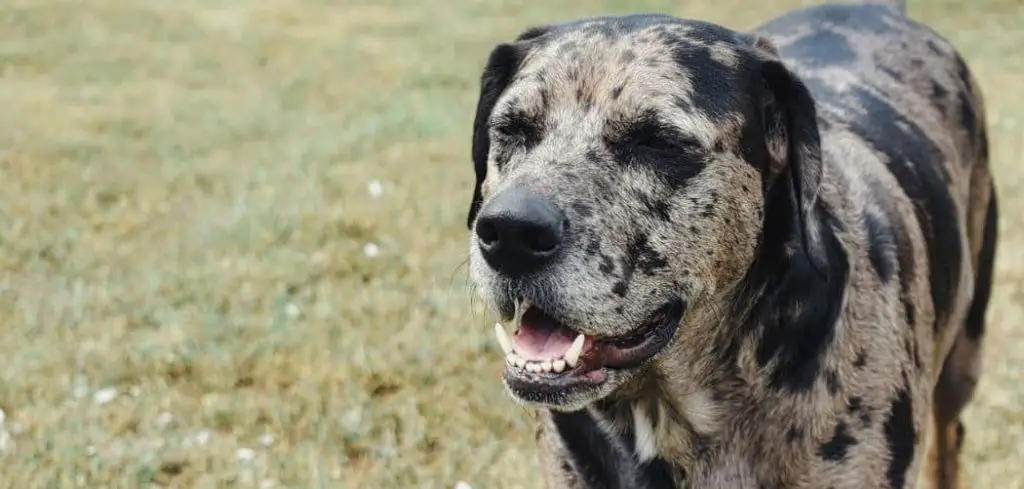When a dog suddenly starts drooling a lot for no clear reason, it can be alarming. While occasional drool can be normal, constant or excessive drooling without an obvious trigger may point to an underlying health issue.
We outline the common causes of excessive drooling in dogs for no reason, what you can do at home, and when to seek veterinary help.
Table of Contents
Dog Drooling Excessively for No Reason — Why It Happens
Excessive drooling in dogs without a clear trigger is often caused by irritation, illness, or stress. Conditions like dental disease, nausea, heatstroke, toxin exposure, or issues with the mouth and throat are among the most common causes.
Sometimes drooling may also point to more serious problems, including organ disease or poisoning. While drool itself is harmless, the reason behind it can be very concerning.

Dog Drooling Excessively for No Reason: Common Causes
Dental Disease
Dental problems are one of the leading causes of unexpected drooling in dogs. When teeth are decayed, gums are infected, or there are painful abscesses, a dog will often salivate more to cope with the discomfort.
Other signs include bad breath, pawing at the mouth, bleeding gums, or reluctance to eat hard food. Left untreated, dental infections can spread deeper into the body, making this a serious concern.
Read more: Dog drooling and not eating (When to worry)
Nausea and Gastrointestinal Upset
Excessive drooling is a common sign of nausea. Just like people may salivate before vomiting, dogs often drool heavily when their stomach is upset.
Causes of nausea include motion sickness, dietary indiscretion, pancreatitis, or even early signs of toxin ingestion. Owners may notice lip licking, pacing, or vomiting along with the drooling.
Heatstroke
Heatstroke is a life-threatening emergency that often causes heavy drooling. When a dog overheats, their body struggles to regulate temperature, leading to panting, excessive salivation, and collapse if not treated quickly.
Dogs left in hot environments, exercised too vigorously in warm weather, or breeds with short muzzles are especially at risk. Alongside drooling, signs include heavy panting, lethargy, vomiting, or seizures.
Toxin or Foreign Object Ingestion
Exposure to toxins or swallowing a foreign object can cause a sudden increase in drooling. Substances like household cleaners, poisonous plants, or even certain foods such as xylitol and grapes can trigger immediate mouth irritation and excessive saliva.
Foreign objects stuck in the mouth or throat, like sticks or bones, may also lead to drool, pawing at the mouth, gagging, or distress. Both scenarios require urgent veterinary care.
Mouth or Throat Injury
Cuts, burns, or sores inside a dog’s mouth can make them drool a lot. This might happen after chewing on sharp objects, encountering electrical cords, or experiencing trauma.
You might see blood-tinged saliva, reluctance to chew, or visible wounds. Because dogs use their mouths constantly, these injuries can worsen quickly and cause significant pain.
Liver or Kidney Disease
Chronic organ disease can also lead to unexplained drooling. When the liver or kidneys are not working properly, toxins build up in the body, which may cause nausea and increased salivation.
This is often accompanied by weight loss, poor appetite, vomiting, or changes in thirst and urination. Because these conditions are progressive, they need medical attention as soon as possible.
What to Do If Your Dog Is Drooling Excessively for No Reason
If your dog is drooling a lot, start by checking their mouth for anything obvious, like stuck food, swelling, or injuries. If you see a foreign object or something concerning, do not attempt to pull it out yourself unless it is clearly safe to remove.
Keep your dog cool and comfortable, especially if the drooling began after exercise or time outdoors. Offer fresh water, but do not force them to drink if they are nauseous.
Avoid giving food until you know the cause, since feeding can worsen nausea or irritation. Watch closely for other signs like vomiting, weakness, or difficulty breathing.
If the drooling continues for more than a few hours or is accompanied by other worrying symptoms, contacting a vet promptly is the safest step.
When to Call or Visit Your Vet
Seek veterinary care right away if drooling is paired with vomiting, lethargy, difficulty swallowing, or signs of pain. Dogs that collapse, pant heavily, or seem distressed should be seen as an emergency.
You should also contact a vet if your dog has sudden drooling after possible toxin exposure, chewing on something sharp, or being outside in hot conditions. In these cases, time is critical for treatment.
Even if the symptoms appear mild, persistent drooling for more than a day or two without an obvious cause should not be ignored, as it can signal an underlying condition that requires treatment.
Read more: Dog drooling diarrhea and not eating (Here’s what it could mean)
Key Takeaway
Excessive drooling in dogs for no reason can be unsettling, and while sometimes it is caused by minor issues, it may also point to something much more serious.
Checking your dog’s mouth, monitoring for other symptoms, and ensuring they are comfortable are good first steps.
If the drooling persists or is linked to signs like nausea, pain, or weakness, a veterinary checkup is the best way to protect your dog’s health. Acting quickly not only eases your dog’s discomfort but could also prevent a serious condition from worsening.
